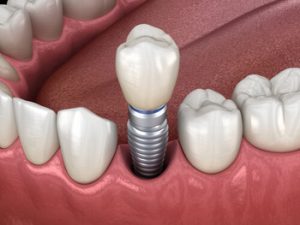Maintaining dental health is critical to overall well-being, especially as we age. The importance of strong, functional teeth cannot be overstated for pensioners. Missing teeth can majorly impact daily activities like eating, speaking, and socialising. Fortunately, dental implants offer a robust solution to these challenges. This blog will dive into the complexities of dental implants for pensioners, highlighting their benefits, procedures, and key considerations.
Understanding Dental Implants
Dental implants are artificial tooth roots crafted with biocompatible materials, usually titanium, surgically implanted into the jawbone. These implants provide a sturdy foundation for fixed or extractable replacement teeth crafted to match natural teeth.
There are two major kinds of dental implants:

Endosteal Implants: These are the most common kind of dental implants. They are placed directly into the jawbone and serve as a base for one or more artificial teeth.
Dental implant treatment involves a multi-step process that ensures the implants are securely anchored and can effectively support the replacement teeth.
Benefits of Dental Implants for Pensioners
Dental implants offer numerous advantages for pensioners, enhancing their quality of life in several significant ways. Let’s delve deeper into these advantages and understand why dental implants are a superior option for replacing missing teeth.
Improved Oral Health
Dental implants contribute significantly to improved oral health. Unlike usual dentures, dental implants do not need the reduction of other teeth.
This preservation of natural teeth helps maintain overall oral health. Replacing missing teeth with implants prevents the rest of the teeth from moving out of place, leading to further dental issues.
Enhanced Chewing and Eating Capabilities
One of the most immediate and noticeable benefits of dental implants for seniors is the enhanced ability to bite and eat various foods.
Dental implants work like natural teeth, letting you enjoy your favourite foods without hassle. This improvement in eating capabilities is particularly important for maintaining a balanced diet and proper nutrition, which is essential for overall health, especially in older age.
Prevention of Bone Loss
When a tooth is lost, the jawbone in the hollow space is damaged due to lack of stimulation. Dental implants are the only dental process that can prevent this bone loss.
They act as artificial tooth roots and activate the jawbone, assisting in maintaining its structure and density. This preservation of bone structure is crucial for maintaining facial aesthetics and preventing the sunken look often associated with missing teeth.
Better Speech and Comfort
Traditional dentures can sometimes slip and cause speech difficulties. Dental implants, alternatively, are securely anchored in the jawbone, eliminating the worry of slipping and allowing you to speak clearly and confidently.
Also, implants are designed to fuse with the bone, making them more natural and comfortable than other dental treatments.
Increased Self-Esteem
Dental implants can restore your smile and overall appearance, significantly boosting self-confidence. This boost in self-esteem can enhance social interactions and improve your quality of life.
Pensioners who opt for dental implant treatment often feel more youthful and confident, ready to engage in social activities without the embarrassment or discomfort of missing teeth or ill-fitting dentures.
Durability and Long-term Solution
One key pro of dental implant procedures is their durability. With proper care and maintenance and upkeep, dental implants can stay durable for a lifetime, making them an affordable long-term solution compared to other dental treatments that may need frequent replacements or adjustments.
Improved Comfort and Convenience

This integration into the jawbone provides superior comfort and convenience, as there is no need for adhesives to keep them in place. Pensioners can access dental implants and enjoy a hassle-free solution that closely mimics the feel and function of natural teeth.
No Impact on Adjacent Teeth
Dental implants do not depend on adjacent teeth for anchors, unlike bridges, which require the grinding down of adjacent teeth.
This preservation of surrounding teeth structure is a significant advantage, contributing to better dental health.
Maintenance of Facial Structure
By preventing bone loss and preserving the health of the jawbone, dental implants help preserve your facial structure.
This aspect is particularly important for pensioners, as it prevents the sunken and aged appearance that often accompanies tooth loss and prolonged denture use.
Cost-Effectiveness Over Time
Although the initial dental implants cost can be higher compared to other dental treatments, their longevity and low maintenance needs make them a cheap solution in the long run.
Many pensioners find that the investment in dental implants pays off over time with fewer visits to the dentist for adjustments or replacements.
By opting for dental implant treatment, pensioners can experience these comprehensive benefits, significantly improving their dental health and overall quality of life. Dental implant procedures offer a reliable, durable, and aesthetically ideal solution to the challenges posed by missing teeth.
Candidacy and Considerations for Pensioners
Not every pensioner is a candidate for dental implants. Several factors need to be considered to determine suitability:
Medical and Dental History
A thorough evaluation of your complete health and dental history is crucial. Conditions like diabetes, heart disease, or osteoporosis may affect your candidacy.
Bone Density and Health of Gums
Adequate bone density is needed for the stability of dental implants. Healthy gums are also necessary to support the implants. In some situations, bone grafting or other procedures may be required to prepare the jawbone.
Financial Considerations and Insurance Coverage
Dental implants can be expensive. Understanding dental implant costs and exploring options for major dental cover or low-cost dental implants can help manage expenses. Some pensioners may also be eligible for free dental care or subsidies.
Consulting with a dental professional will clarify these considerations and help you make an informed decision.
The Dental Implant Procedure
Getting dental implants involves several carefully coordinated stages to ensure the best possible outcome. Here, we will walk you through the entire dental implant procedure, from the first consultation to the final adjustment of your new teeth, emphasising the steps and considerations particularly relevant to seniors.
Initial Consultation and Planning
The first stage in the dental implant procedure is an initial consultation with your dentist. During this appointment, your dentist will observe your dental health, discuss your medical history, and take detailed X-rays or 3D images to evaluate your jawbone’s condition and the implant’s exact placement.
This comprehensive evaluation is crucial for crafting a personalised treatment plan tailored to your needs. For seniors, this assessment also includes discussions about any underlying health conditions that could impact the procedure.
Implant Placement

The implant, usually titanium, is inserted into this hole. The gum is then stitched back over the implant. This phase of the procedure might sound daunting, but advancements in implant dentistry have made it a routine and highly successful treatment. For seniors, it’s essential to follow pre- and post-operative directions carefully to ensure proper healing and integration of the implant.
Healing Process (Osseointegration)
After the dental implant adjustment, a healing period is necessary for osseointegration. Osseointegration is the process where the implant merges with the jawbone, curating a sturdy and stable foundation for the replacement tooth.
This process can take several months, but it is crucial for the long-term success of the implant. During this time, it is important to maintain a good oral regime and follow your dentist’s directions to promote healing and prevent infection. For seniors, the healing process might take slightly longer, but proper care can be just as successful.
Abutment Placement
Once the implant has successfully adjusted with the jawbone, the next step is to adjust an abutment. An abutment is a small merger that connects to the implant and holds the replacement tooth or crown.
This involves a minor invasive procedure where the gum is reopened to make the implant apparent, and the abutment is connected. The gum tissue is left to heal around the abutment, usually taking two weeks.
Crown Placement
The final stage in the dental implant process is the crown adjustment, which is the apparent part of the tooth.
Once the gum around the abutment has healed, impressions of your mouth are taken to craft a custom crown that resembles your natural teeth in shape, size, and colour.
The crown is then securely connected to the abutment. This step completes the dental implant treatment, providing a functional and aesthetically ideal tooth replacement.
Post-Procedure Care and Maintenance
Proper upkeep and maintenance are crucial to the durability and success of dental implants:
Oral Hygiene
Maintaining excellent oral hygiene is essential. Brush and floss consistently to keep the implants and surrounding gums healthy.
Regular Dental Check-ups
Schedule regular visits to your dentist to observe your implants and address any issues promptly.
Tips for Maintaining Implants
Avoid hard or sticky foods that can deteriorate the implants. Use antibacterial mouthwash to keep your teeth clean and infection-free.
By following these guidelines, you can ensure the longevity and functionality of your dental implants, contributing to improved oral health.
Conclusion

Ready to transform your smile and enhance your oral health? Contact Finesse Dental at (02) 8806 0790 to schedule a consultation today!
Note: Any surgical or invasive procedure carries risks. Before proceeding, you should seek a second opinion from an appropriately qualified health practitioner.
References:
https://www.webmd.com/healthy-aging/dental-implants-for-seniors
https://scholar.google.com.pk/scholar_url?url=https://www.degruyter.com/document/doi/10.2478/s11536-011-0125-y/pdf&hl=en&sa=X&ei=PvFOZp6OOuzKy9YPtfWMmA4&scisig=AFWwaeaGUXAO_LjWIU8DJTtGLFzX&oi=scholarr

